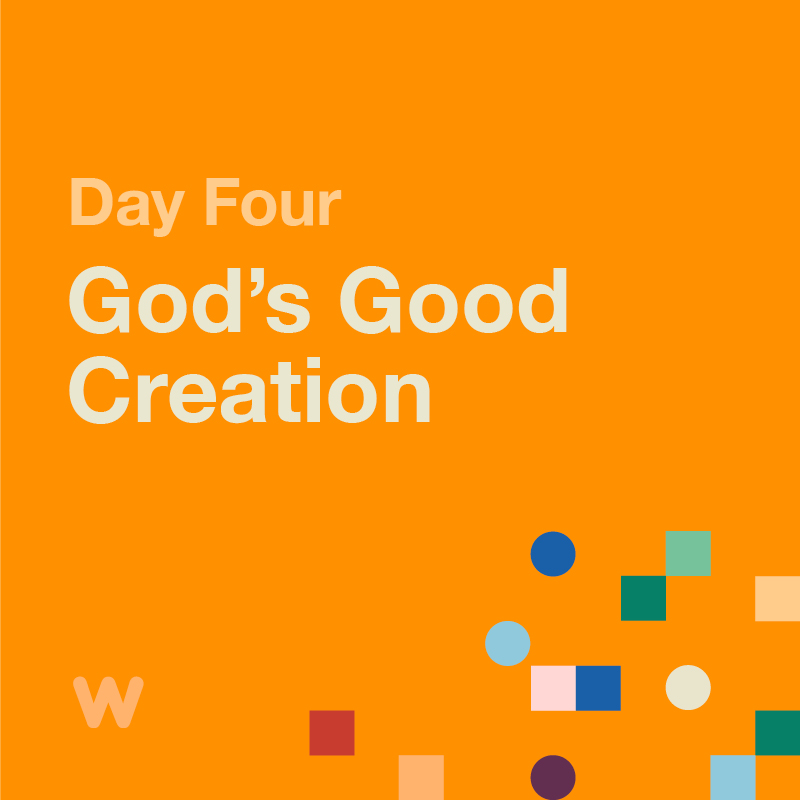Genesis 1-2: Verse by Verse With Bible Study Fellowshipનમૂનો


The Fourth Day
Sun, Moon and Stars (1:14-19) – The fourth day signifies a transition. God now begins to fill the heavens and earth He had formed. On day four, God fastens lights in the sky to serve as signs marking the seasons, days and years. Every location on the globe experiences the regular rising and setting of the sun and the predictable changing of seasons that give order to life. Never once has our faithful Creator forgotten or failed to cause the sun to rise or the seasons to change. God’s faithfulness, as witnessed in the sky above us, benefits every human who has ever lived.
The Fifth Day
Life in Sea and Sky (1:20-23) – God fills the waters and sky with life. In contrast to plant life, animal life has the ability to feel and perceive. The Darby Bible conveys this designation of life when it translates 1:20 as, “And God said, ‘Let the waters swarm with swarms of living souls…’ ”
We see the Hebrew word bara used again in Genesis 1:21. From ocean depths to high above the earth, God creates creatures suited to every environment. The brilliant colors of tropical fish dazzle us. Birds sing songs unique to their species, overcome gravity to take flight and migrate in clearly prescribed paths.
God also blesses His creation for the first time on the fifth day. The word “blessed” means to make happy; to give divine favor. God blesses birds and water creatures with fruitfulness – the power to reproduce according to their kinds. After receiving life from God, they become able to pass life on.
We can look to the fossil records and marvel today at the variety of species God has created. When we honestly examine their interdependence and designs, it is easy to revere our good, creative, caring God. He is worthy of our praise and our joyful obedience to live out our days by faith.
God Saw It Was Good
Seven times throughout the creation account, God declares His creation “good.” Creation is not good only because it is practically useful to us. Creation is good because God made it and declared it good in and of itself. The goodness of creation reveals God’s nature. He alone is fully good and thus can create only what is good.
Even after the Fall and spread of sin, God upholds creation’s value. In Genesis 9, God establishes a covenant with Noah, Noah’s descendants, every living creature and even the earth itself after the flood.1 Similarly, in Romans 8, God includes all of creation in His promise of future deliverance. 2
If God finds creation good, we must find creation good as well. This means:
- We should be thankful for God’s creation and praise Him for it.
- We should delight in creation.
- We should demonstrate a responsibility toward creation.
Questions
- How does the “light” in verse 3 compare with the “lights” on the fourth day?
Insights: The day one “light” (1:3) was not described as from an object. It pierced the darkness and was called day. The fourth day “lights” separate the day from the night (1:14); mark seasons, days and years (1:14); give light to the earth (1:15, 17); and govern day and night (1:18 – they seem to replace the first day light in terms of function). Now, the fourth day lights are made in part to mark and measure the passing of time. - What conclusions do you draw from the repeated phrase “and God saw that it was good”?
- How does Psalm 148 relate to Genesis 1, and what will you particularly praise God for today?
Related Verses
- Noahic Covenant: Genesis 9:9-10, 13
- Promised deliverance: Romans 8:21
Scripture
About this Plan

What do you wonder about God, yourself and everything else that fills our world? Genesis declares the whole story: the God who graciously creates splendor is also the God who lovingly redeems His creation from sin, giving us hope for our lives and the world. Spend 10 days exploring God’s intended bliss; first created, and now revealed, to call all people to live under His love, authority and blessing.
More
સંબંધિત યોજનાઓ

Thessalonians 1-2: Verse by Verse With Bible Study Fellowship

Why Doesn't God Do Something?

Wait on It

Regroup - a Process of Healing for Pain, Grief, and Addiction

Until Unity

Resurrection

God Victorious - a 3-Day Devotional With Andrea Olson

Good News...for All People!

Trust in the Trials
